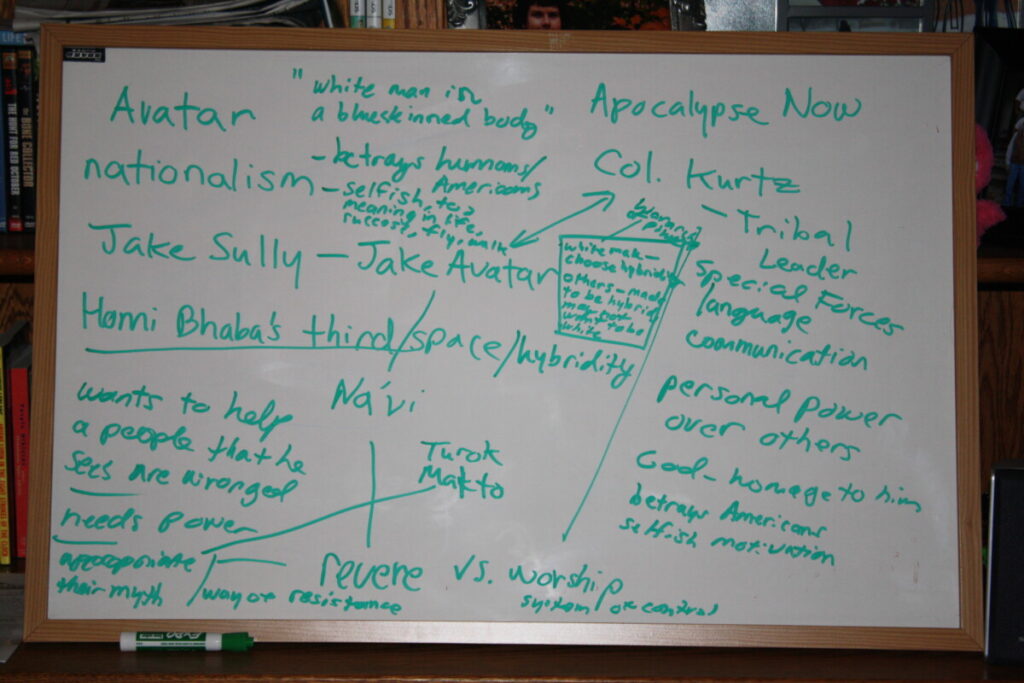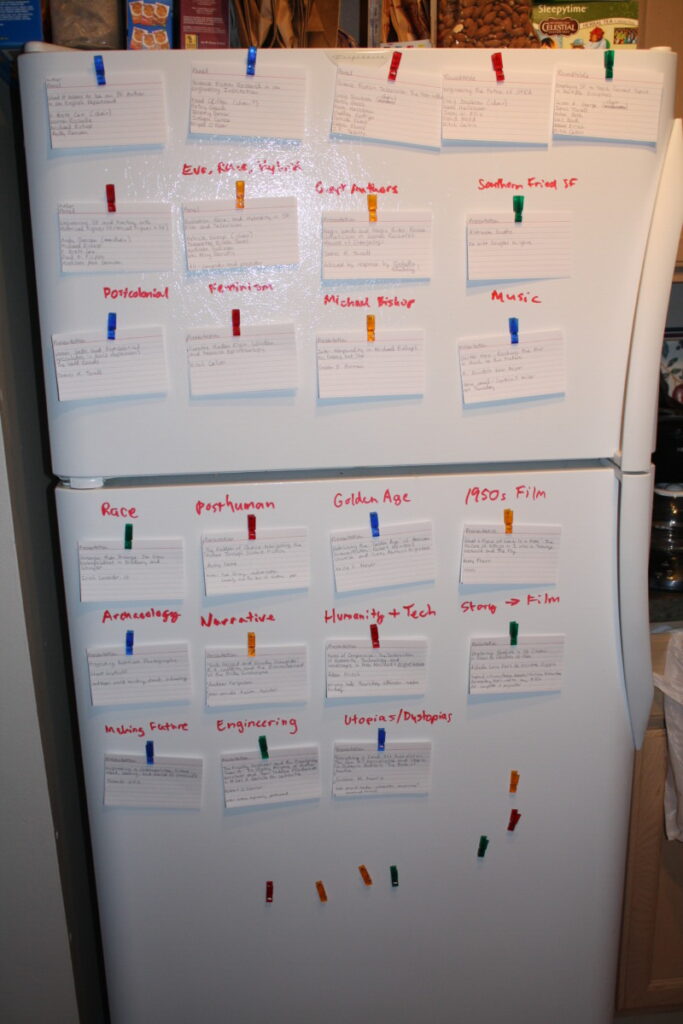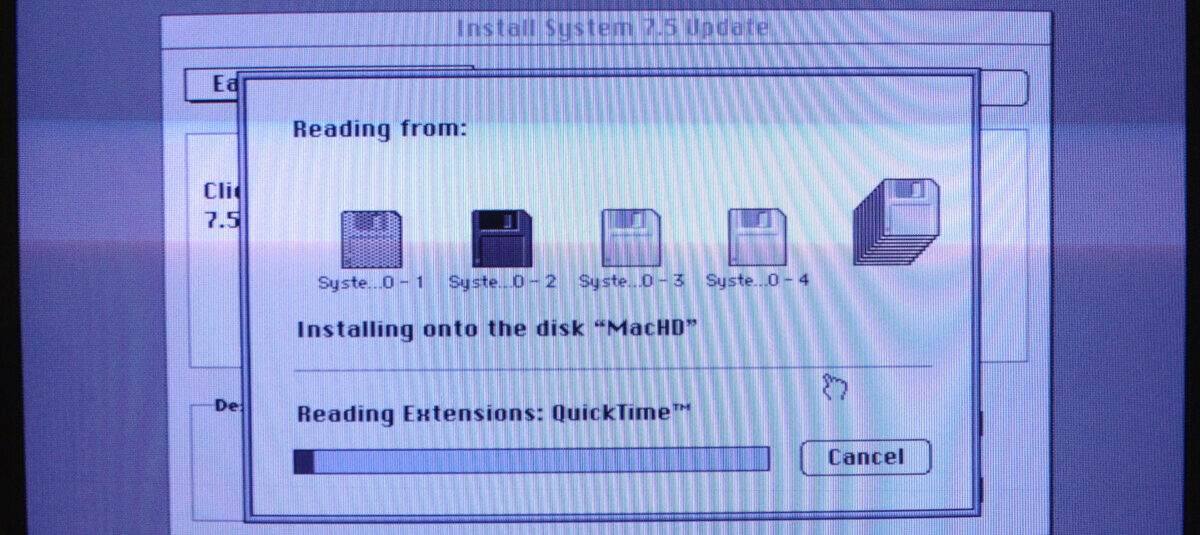

The above outlining (left) and organizing (right, a lite form of information architecture) are not final deliverables, but doing the work that goes into them might help us create better and more effective technical communication deliverables. The outlining and brainstorming on the left led to an academic conference paper. The organizing on the left using a refrigerator, dry erase markers, index cards, and magnetic clips led to an academic conference program. Both were low-tech ways to organize and categorize ideas before formalizing them in a paper for public presentation or a printed program saying which presentations are grouped together and presented in a space at a given time.
For this week’s class:
- Weekly Reading Report Exercise
- Discuss this week’s readings
- Introduce this week’s (and next’s) deliverable: Reports
- My Professional Work, Our Sandbox Exercise
- Perform Peer Review on last week’s deliverable
- Begin working on this week’s deliverable for Reports
- Review syllabus about next week’s readings and work.




To: Professor Ellis
From: Tiana Beatty
Date: 10.13.22
Subject: Readings
Reading about reports and technical communication has opened up my eyes to know that reports and the templates for those reports take a lot of time and work to do. I remember doing book reports in my elementary and middle school years and there wasn’t much thought processes going into it because as long as I read the chapters or the entire book that were required and I could briefly explain what I read I would get a passing grade. But reading about a report on certain subject matters impressed me that this is what technical communicators do in their creative and respective fields. There’s so much to discussion, to format, and explain in depth what goes into a report but because I don’t have much experience in this kind only reporting it would be interesting to understand and to learn more about.
TO: Professor Ellis
FROM: Khaled Akam
DATE: October 13, 2022
SUBJECT: Proposals/Reports
As we are both communicators and technologists, we should possess the ability to adapt and be able to change tool sets or skill sets for any given document. We use the tools that we practice and build to help people in every aspect of the world. As a technical writer knowing when to change your identity to write a document is important. Having a structured design when writing a document is important as well. In a document you must be consistent with your thoughts even though sometimes you do not know what your opening will be. You just write down details until it manifests itself through your writing. As you write, have a clear understanding of what you want to convey to the reader. Everything that you put in the document should correspond to helping your purpose as a technical and professional writer. These writing elements help give your insight on what works for your academic and professional work. It is something you take with you to for a job or future in writing. As we practice our tools, we begin to form an embryo of a basic technical communicator in our academic career. We build and work on it until we can utilize it and form professional work. But this does not mean we are finished with our work because technology and communication changes and even though our basics are with us, our functionality must adapt.
To: Prof. Ellis
From: Bria Glenn
Date: October 13, 2022
Subject: Technical Writing
In the article “Has Technical Communication Arrived as a Profession” it discusses a bit of the background of technical communication and how it was developed into a profession as well as a field of study in which courses were made for it. It has an early start dating back to the 1920s, with It being introduced to universities around the 1960s. Throughout the reading and with the data gathered from those who participated in the study, it showed that technical communication was not only a writing career, but also partly design as well. Having to know about certain design softwares was something discussed along the lines of what you have to know to get the job. We know there is technology in technical communication, but the other aspect that is very important is the communication part. Being able to work with others on a project, give a report on what the you may be working on and being able to explain in detail to others who may not be so familiar with a topic or item what it is the may be looking at.
TO: Professor Ellis
FROM: Khemraj Persaud
DATE: 10/13/22
SUBJECT: Week #7 Reading Response
In the first reading assignment, Planning and Organizing Proposals and Technical Reports, Richard Johnson-Sheehan, Ph.D. gives step by step instructions as to how proposals and technical reports are written. It contains worksheets to help with organization, as well as identifying different elements that are to be included in the final product.
The second reading assignment we had, The Future is the Past: Has Technical Communication Arrived as a Profession? by Pringle and Williams gives a brief summary of the history of technical writing, before getting into results of a study they did about how technical communicators identify themselves as a professional, the type of work they actually do, as well as how they use technology as a tool. Most of the people included in the survey identified as communicators, while using technology to convey their messages, as opposed to technology dictating the work done.
The third and final reading we did, Reporting for Results: Creating a Checklist, by Philip Vassallo, Ed.D, breaks down how a report is constructed. It emphasizes knowing your audience, and understanding that someone may need to use said report for different reasons at different times. He then goes on to give detailed notes about the individual parts of a report, what they should entail and how they should be delivered. Overall, a report is a complex and highly organized document that has many layers which help provide the information within as best as possible.
To: Professor Ellis
From: Aaron Nieves
Date: 10/13/22
Subject: Week 7 Reading Report
Proposal writing can arguably be one of the most important pieces to write for a company. The growing need for these professional writers have grown, as well. You are advocating for a change or for something of important towards the company/organization you work for.
We learn about the importance of organizing and planning out a proposal, from the article by Purdue. Even if we’re able to gather our thoughts in charts using a few words can be very beneficial towards seeing the bigger picture.
This is something that can be carried over into all forms of writing. It creates an easier transition putting your thoughts into coherent sentences.
To: Professor Ellis
From: Sandy Fougeres
Date: 10/13/2022
Subject: Weekly Readings
In this week’s readings the article “The Future is the Past: Has Technical Communication Arrived as a Profession” by Kathy Pringle and Sean Williams, they discuss whether technical communication has changed and whether it is now considered a profession. They discuss how there is some confusion whether technical communication focuses more on the technical aspect of the job or the writing. In the article Roger Grice and Robert Krull talks about the duality of technical communication, and conducted a survey to determine how technical communicators do their jobs and what they considered their jobs to be. They also wanted to see whether the job was primarily used technology or if it was mainly being a technician in the field. The results showed that most of the communicators felt they didn’t rely mostly on technology, but that they needed to understand their audience to convey a certain message through writing.
In the article “Reporting For Results: Creating a Checklist” by Philip Vassallo, he discussed how to be a successful at technical reporting through gathering information and provided a format for technical writing. I found both articles to be very informative as I learned more about how technical communicators view themselves in the work field. As an aspiring technical communicator, I felt this was insightful and helpful as I got a better understanding of what to expect as a technical communicator.
TO: Professor Ellis
FROM: Naila Butt
DATE: 13 October 2022
SUBJECT: Reports & What Defines a Technical Communicator
I found the readings informative as I have never written a report. The purpose of a report is to gather and present data that answer a specific research question. To write an efficient report, you need to define the subject, purpose, and main points to the reader. Once you have established this framework for your report, I think writing a report becomes more efficient. There was a lot of information on composing a report, and it was a lot to process for me, but thankfully I can refer back to these readings when writing my report. I appreciated the information presented in the Purdue reading because it was easy to read and gave clear and concise information on what makes a report.
On another note, In the reading, Has Technical Communication Arrived as a Profession? The data on what technical writers define as their role as technical communicators was interesting to read. I was surprised that 14 participants said their roles in technical communication could be defined by ‘audience analysis’ while ‘communicating’ and ‘writing’ had fewer participant votes. I would think that communication and writing would have more votes, but I also understand why audience analysis is significant in the technical communication role. This article gave me an insight into what to expect in a role of a technical writer.
To: Professor
From: Timothy B
Date: October 13, 2022
Subject: Weekly Reports
Planning and organizing Proposals and Technical Reports is about knowing and differentiating between readers and technical communicators. There are One has learned that to fully sought out an thorough technical report that a lot of groundwork and research has to be done. When demonstrating analytical or technical reports technical communicators must provide a lot of information about the metrics of software design because they could come across readers that aren’t particularly familiar with the information.Technical communicators have an important strategic way in how they carry out their jobs in their respective fields.